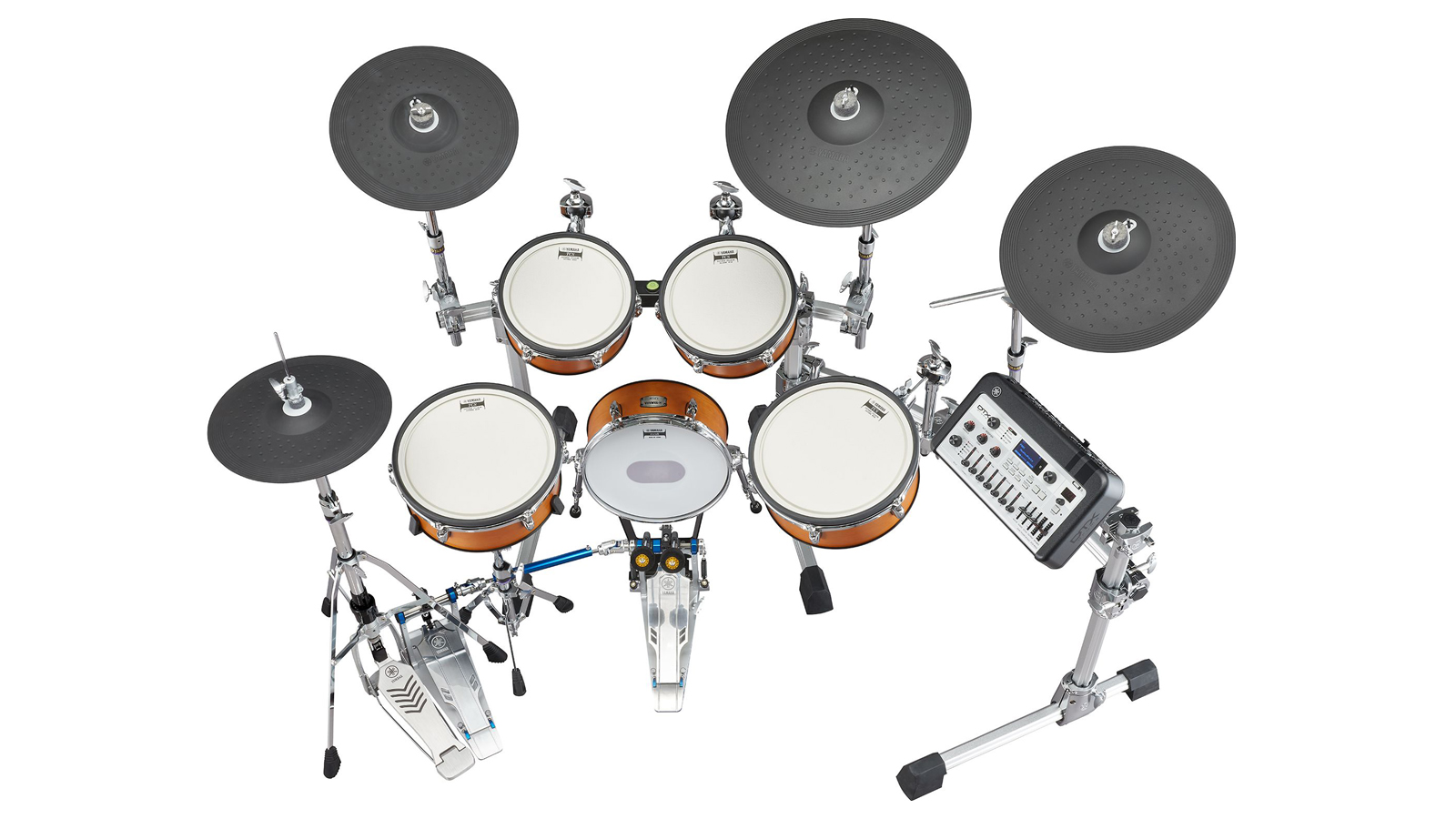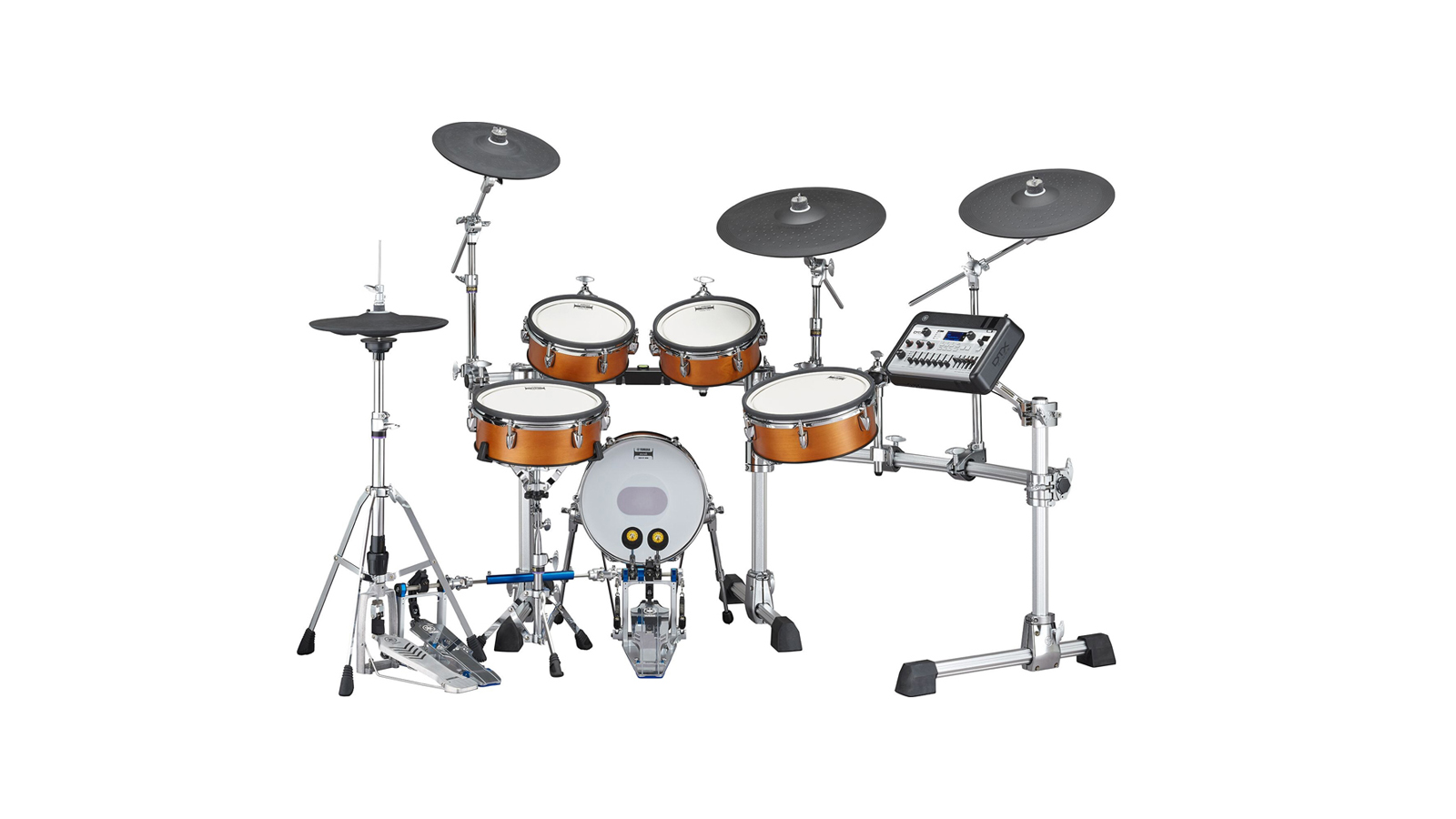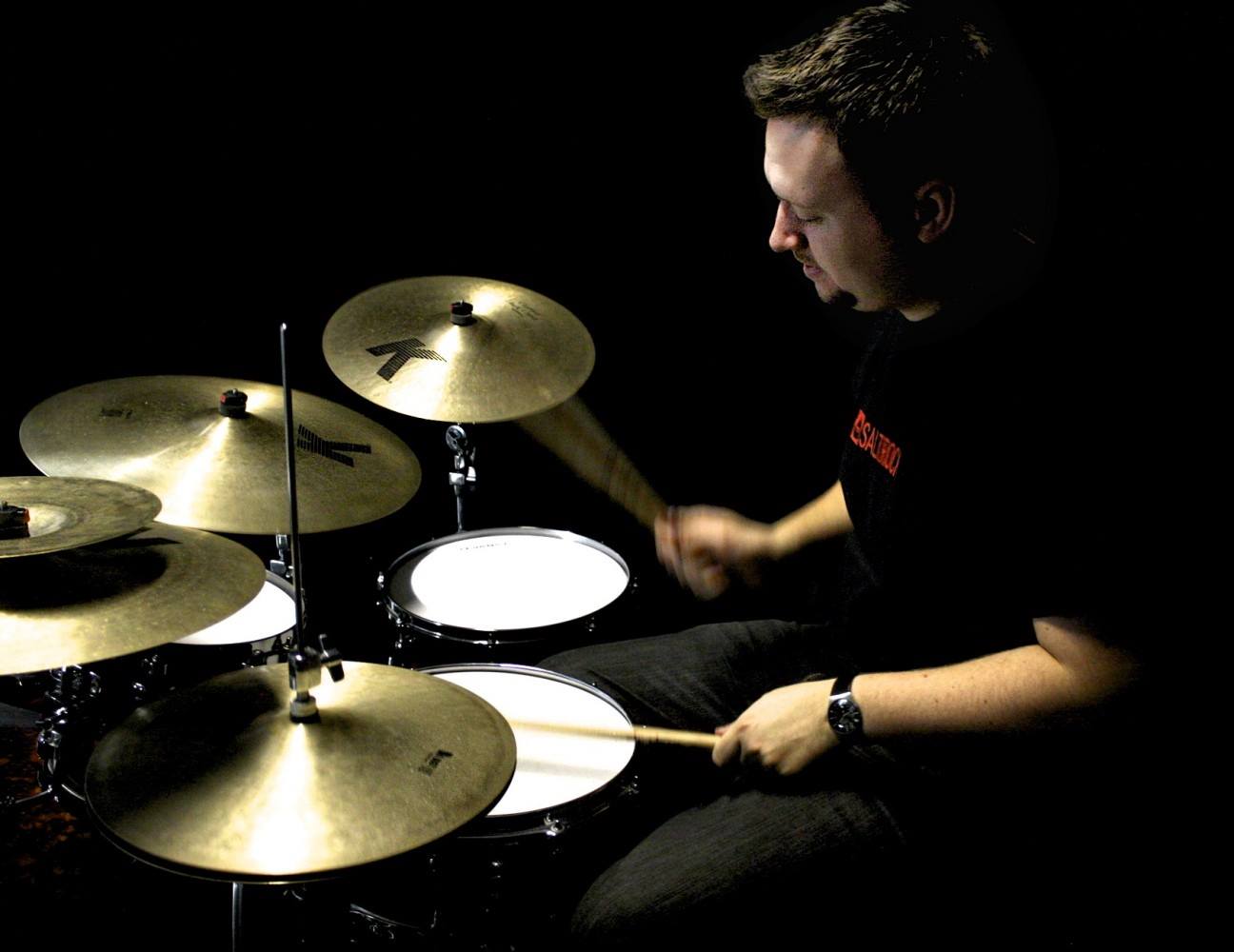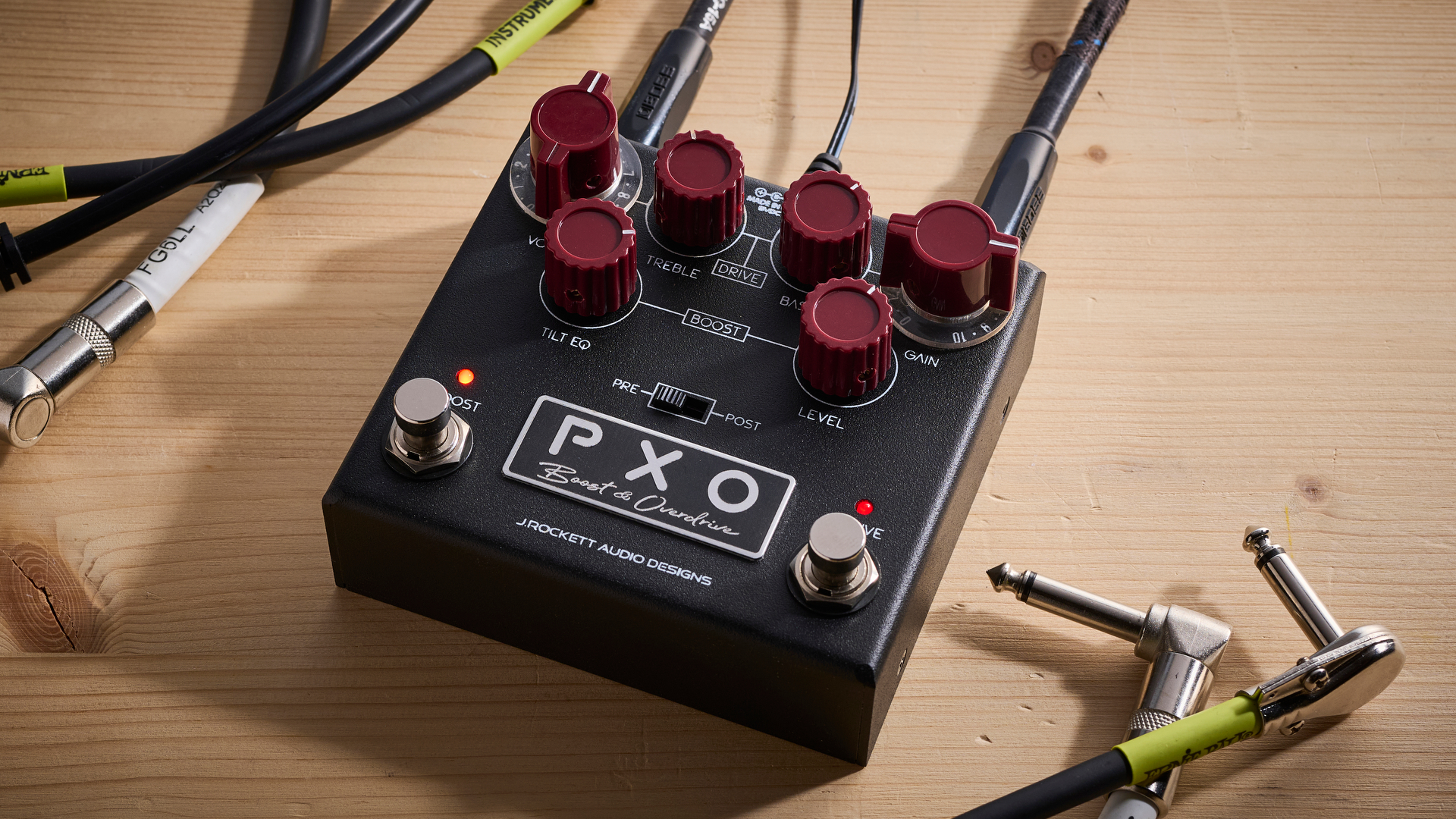MusicRadar Verdict
Yamaha’s latest addition to its electronic drums range is as stage-worthy as they come. Not only does it look the business but a host of top-end features delivered by the powerful DTX-PROX module makes it a versatile tool for home or stage, not to mention excellent fun to play.
Pros
- +
Real wooden shells and metal hardware for a stage-ready look
- +
The DTX-PROX module has some real tricks up its sleeve
- +
Fantastic samples and multi-fx make for incredible drum sounds
Cons
- -
Trigger settings need work out of the box
- -
Only one additional trigger input
- -
Some of the built-in kits are a little gimmicky
MusicRadar's got your back
Yamaha DTX10K-X review: What is it?
In recent years we’ve witnessed electronic drum sets growing larger (both in popularity and physical size), with a new breed starting to closely resemble acoustic drums. This trend can be seen across many major brands which include Roland’s VAD range, Gewa’s G Series, Pearl’s e/Merge and more. Yamaha’s latest addition to this ready-for-the-stage e-kit market is the new flagship DTX10 series which, as the Japanese company states, “boasts the beauty of real drums”.
Available in Real Wood or Black Forest finishes, the wooden shells go some way to giving the DTX10 an acoustic kit aesthetic (also helped by the chrome Yamaha lugs) however a middle ground is struck between the more low-profile electronic pads and the deeper toms that we all recognise from our acoustic kits.
There are two variants of the DTX10, one of which comes with mesh heads and the other Yamaha’s proprietary TCS (Textured Cellular Silicone) heads. The DTX10K-M and DTX10K-X both feature two 10” and one 12” tom pads, 12” snare pad, 12” bass drum pad, 13” hi-hat, 13” and 15” crash cymbals. Both kits are powered by Yamaha’s DTX-PROX module which is brimming with incredible features such as high quality samples, individually assignable multi-fx, space for 1000 user samples, recording to USB memory, recording via USB audio, Bluetooth audio (brilliant for playing along to tracks from a smart device), equaliser and setlist creation, to name a few. The setup is completed with a heavy duty Hex-style rack (RS10-HXR) plus stands for the hi-hat and snare pads.
Yamaha DTX10K-X review: Performance & verdict

For review we have the DTX10K-X in Black Forest finish, complete with Yamaha’s TCS heads. These unique heads feature a textured silicone playing surface full of tiny air bubbles which Yamaha says makes it play closer to that of an acoustic head. In practice the pads play extremely well and offer a surprising amount of rebound, although less so than a mesh head. For those that complain that mesh heads are too bouncy, the TCS could be just the ticket. They also produce very little acoustic sound when struck.
The cymbal pads are tri-zone (except the hi-hats which are dual) which means separate triggering for the bell, bow and edge of the cymbals. As with previous Yamaha e-kits this is possible through a single stereo jack cable which is not necessarily the norm across all manufacturers. Unfortunately, however, with this configuration there is only one spare trigger input on the module, so not a huge amount of room for expansion.
In terms of general playability the DTX10K-X is absolutely fantastic. The cymbal 13”, 15” and 17” cymbal sizes compliment the 10” and 12” pads perfectly and the kit doesn’t feel small despite these relatively compact dimensions. It certainly doesn’t sound small either thanks to the top-end samples delivered by the DTX-PROX module. Unlike some other e-kits the rims of the dual-zone toms are programmed as rimshots - enormously enhancing the overall feel of the kit and proving rather addictive to play.
The module itself is relatively plug-and-play, although extra time spent tweaking the trigger parameters to your own playing style will be greatly rewarded. We found that we had to dig in on the toms more than usual while the cymbals are the opposite by default. Thankfully multiple trigger settings can be saved and recalled for different playing situations. For example, quiet practice at home vs full-on gig mode, or even a configuration that uses acoustic triggers. On a similar note, it’s worth mentioning that any changes to kit settings need to be saved before advancing to a different kit or powering down the module otherwise they will revert to default.
The module has 70 built-in kit presets which for the most part are made up of fantastic acoustic samples. These are balanced with a number of electronic style kits which seem to be mostly there to showcase the vast effects available within the DTX-PROX. These can be dialled in using an LED rotary dial alongside compression and ambience (taken from the actual room mics of the recorded samples). There is also space for an enormous 200 user kits.

Kit editing is made easy by more rotary dials which allow quick access to the mixer, instrument changes, tuning, muffling and effects. There are also physical faders for audio ins, click, master output and phones. The menu system takes a little getting used to but the physical dials are ideal for speedy changes.
Finally, the Live Set feature allows combinations of kit, tempo and audio files to be set up in a custom setlist. This will no doubt be welcome news to those wanting to use the DTX10K-X on stage, particularly if running backing tracks.
Yamaha DTX10K-X review: Hands-on demos
Yamaha_Global
Drummers Only
Sweetwater
Yamaha DTX10K-X review: Specifications
- Acoustic shells: 10”, 10”, 12” dual-zone toms, 12” tri-zone snare (with positional sensing) and 12” bass drum pad
- Anti-swivel cymbals: 13” and 15” tri-zone crashes, 17” tri-zone ride (with positional sensing) and 13” dual-zone hats
- Heads: Textured Cellular Silicone (TCS)
- Kits/sounds: 70 kit presets and room for 200 user kits, up to 1000 user samples
- Other features: Bluetooth audio, USB audio, record to USB memory (max 90 mins), up to 8 direct outputs, powerful Multi FX and ambience settings, Live Set function, heavy-duty RS10-HXR rack, professional grade headphone amp, built-in training functions, full dot LCD
- Supplied software: Cubase AI
- Contact: Yamaha
Tom is a professional drummer with a long history of performing live anywhere from local venues to 200,000 capacity festivals. Tom is a private drum tutor, in addition to teaching at the BIMM Institute in Birmingham. He is also a regular feature writer and reviewer for MusicRadar, with a particular passion for all things electronic and hybrid drumming.
“I’m looking forward to breaking it in on stage”: Mustard will be headlining at Coachella tonight with a very exclusive Native Instruments Maschine MK3, and there’s custom yellow Kontrol S49 MIDI keyboard, too
“The thing from the agency said, ‘We want a piece of music that is inspiring, universal, blah-blah, da-da-da...' and at the bottom it said 'and it must be 3 & 1/4 seconds long’“: Brian Eno’s Windows 95 start-up sound added to the US Library of Congress
MusicRadar deals of the week: Enjoy a mind-blowing $600 off a full-fat Gibson Les Paul, £500 off Kirk Hammett's Epiphone Greeny, and so much more











